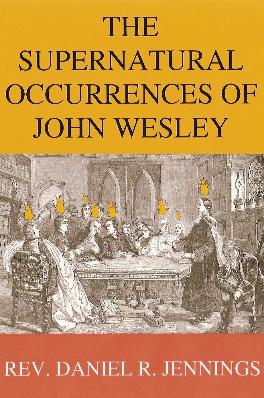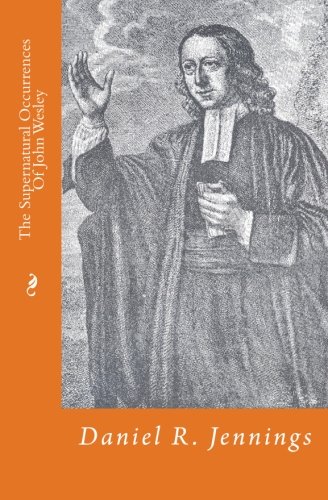Daniel Jennings: The Supernatural Occurrences of John Wesley
 Daniel R. Jennings, The Supernatural Occurrences of John Wesley (Oklahoma City: SEAN Multimedia, 2005), 155 pages.
Daniel R. Jennings, The Supernatural Occurrences of John Wesley (Oklahoma City: SEAN Multimedia, 2005), 155 pages.
This is a book I wanted to write but never did. In seminary in the 80s, I realized with increasing clarity and conviction contemporary Pentecostalism’s unspeakable debt to the incredible career of the Rev. Mr. John Wesley. I determined then to someday identify and extract from his amazingly exhaustive Journals occurrences of Pentecostal-like phenomena in his meetings and ministry. Alas, but other things crowded out this well-conceived intention and I failed to follow through. Rev. Daniel R. Jennings, a graduate of John Wesley College and theological student at Liberty University, a church planter and campus pastor as well as an international speaker, has succeeded in succinctly summarizing “supernatural occurrences” that Wesley reports over the course of his protracted and prolific ministry at the center of one of the greatest revival movements in Christian history. How enriching and uplifting to discover that the Oxford don intellectual and able organizer of Methodism was also intimately acquainted with the inner workings of the spiritual realm and the trans-natural world. Supernatural Occurrences will be a boon to all students of revival, Wesley, and Wesleyanism as well as those who simply desire a practical and proven pattern for powerful ministry.
Jennings’s approach is simple and straightforward. After the briefest introduction to the life and career of Wesley, he immediately proceeds to list extraordinary phenomena from Wesley’s Journals. A chapter each is dedicated to spiritual warfare, miraculous healing, slaying in the Spirit, holy laughter, speaking in tongues, and other “unusual manifestations” of the Spirit, as well as prophecy, visions and dreams, divine retribution against enemies, experiences with angels, and supernatural answers to prayer. Generally, Jennings lets Wesley speak for himself, himself only extracting and organizing for readers the relevant material. Wesley, himself an adept editor and extractor of others’ writings, would probably be pleased. Occasionally, Jennings adds concise and non-cumbersome footnotes for explanatory purposes where modern readers benefit from attention to historical context. Sometimes Jennings includes his own non-intrusive interpretative analysis. The clear consequence of reading Supernatural Occurrences is an unmistakable impression that Wesley’s revivalist ministry was commonly characterized by what are today almost universally recognized as charismatic type encounters, events, and experiences.

The cover from the 2012 reissue of The Supernatural Occurrences of John Wesley.
Jennings continues with chapters surveying Wesley’s interpretation of baptism with the Holy Spirit and his opinion on miracles. Setting Wesley’s views on Spirit baptism in an Anglican hermeneutical context, Jennings argues that he thought of it in terms of conversion-initiation with an emphasis on sanctification. Recent dialogue in Pneuma: the Journal of the Society for Pentecostal Studies,between acknowledged Wesley experts Donald Dayton and Larry Wood, each taking opposite sides in this discussion, should warn readers against oversimplifying or underestimating Wesley’s belief and experience on Spirit baptism. Personally, I probably favor the view that Wesley’s dynamic and developmental pneumatology encompassed conversion-initiation with a focus on sanctification along with space for subsequence and empowerment themes. Of course, Jennings is correct that Wesley supported the possibility of speaking in tongues but never taught the doctrine of initial evidence.
Category: Church History, Summer 2007


